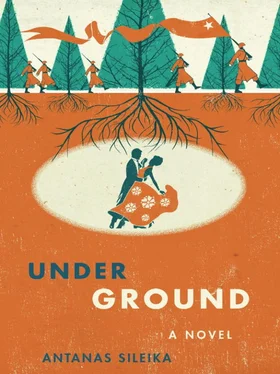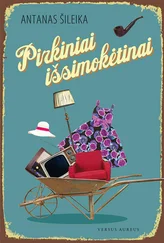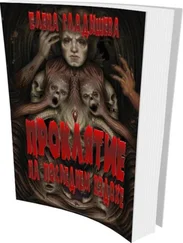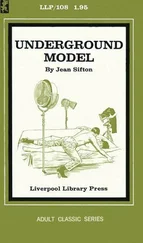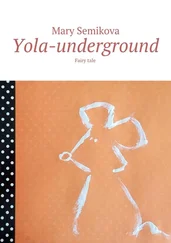“The smell of hay always reminds me of harvests and afternoon naps. It makes me sleepy,” said Lukas, settling in beside Lakstingala. “Aren’t you afraid you’ll drop off?”
“I never fall asleep on sentry duty,” said Lakstingala. “If I did, I would have been dead long before this.”
They each knew many dead, in addition to Vincentas and Ungurys. Almost a dozen men had fallen that day in Merkine, and twice as many in the year afterward. New men came to join them, but Flint, Lakstingala and Lukas were among the veterans, men you could be sure of, not only because of their experience but also because of their luck. Caution and skill were important for survival, but so was luck. Why did some fall in a firefight and not others? At any moment the three dice of skill, caution and fate were tumbling; a partisan could control two of the variables, but not the third.
In the last year Flint’s band had broken into smaller units of five, very few with the knowledge of where the others had their bunkers. The era of bonfires and dancing in the forest was past, and as well the time of massive attacks upon towns and garrisons. The last really bold act had been the engagement party massacre in Marijampole. That act had been both gratifying and stupid. It lifted the spirits of the Lithuanians as word got out about it, but it excited a whole hornet’s nest of Reds, Chekists and slayers, who combed the woods looking for partisans.
The latest partisan battle was against the settlers, Red soldiers who were encouraged to demobilize in Lithuania and take up the farms abandoned by those who had been deported or fled to the West. Lukas wrote public proclamations in Lithuanian and Russian, warning them not to take up the farms, and then letters to the new settlers, giving them a month to vacate their land. Lakstingala led the enforcement brigades that frightened off the settlers, or executed them if they did not heed the warnings.
This type of fighting was more damaging to the soul than battles with Chekists or slayers. Sometimes the settlers resisted, barricading themselves into their houses and shooting it out. It was important to remember that these were the enemy, that they had been warned, that they could have surrendered with a white flag and been escorted with their wives and children out along the road. Still, it was hard to drop a grenade into a house with women and children inside.
Lakstingala and Lukas did not have that much in common, but they had been together in Flint’s band for almost two years, and so they had become comrades. It was easier to talk to someone like Lakstingala than it was to some to the newer recruits.
“What if the Reds come up on us from the other side of the haystack?” asked Lukas. “You won’t see them coming.”
“The rest of the American’s family is working in the fields that way. They’ll come running if anything’s up.” Lakstingala took out a pouch of tobacco and some papers. He rolled a cigarette but did not light it because of the haystack. The smell of the hay at his back reminded Lukas of home.
“Going to do a little travelling?” Lakstingala asked.
They compartmentalized each other’s lives, knowing some parts and staying intentionally ignorant of others. The question itself was a sign of their intimacy and comradeship.
“Personal business.”
“You’re a fool,” said Lakstingala without a moment’s hesitation and without a great deal of inflection.
“What do you mean?”
“Anything personal will put you at risk. You’ll be caught in a moment.”
“I’ll be careful.”
“There’s no being careful in a trap. Once you’re inside, they’ll spring it on you and that will be that. And you take this risk to see Elena?”
“That’s right.”
“You’d give her a better chance of survival by staying away from her. Don’t you think the Reds would love to catch the two of you together? You’d be a real prize. If they caught you alive, they’d put your photos on the cover of the local Pravda . If they killed you, they’d set your bodies up side by side in the market square and put a wedding veil on her body to satisfy their sense of humour.”
“You’re sounding a little too angry, my friend. I can’t help it that I’m in love.”
“What kind of love could that be? You hardly know one another. A few meetings and one mission and your head’s been turned.”
“People fall in love at a dance in one night. It happens.”
“No, you’re confusing comradeship with love.”
“You’re my comrade, but I don’t love you.”
“Don’t make fun of me. I’m serious.”
Lukas took off his hat and ran his fingers through his hair. “Look who’s talking about love! A bachelor soldier like you!”
“I’m no bachelor. I’m married.”
“What? You never told me that.”
Lakstingala shrugged. “You never asked me.”
Lukas looked at him with new interest. “I had no idea. And you’ve never seen your wife all these years?”
“Not much.”
“But a little, right?”
“A little,” Lakstingala conceded.
“So why do you begrudge me?”
“Because I’m worried that you’re turning soft just as things get harder, just when you should be getting tougher. We’re not the first ones to go into the woods, but we’ve lasted longer than anyone else. How are we going to survive unless we turn our hearts to stone?”
“I don’t understand you.”
“It’s not the Reds that worry me. It’s your feelings. Those are what are going to get you killed.”
“How is it possible to live without feelings?”
“It’s not, but you have to bury them in order to fight. If you become soft, you’ll see the eyes of his mother in every Red you kill and you’ll hesitate, and one day you’ll die yourself. The only feelings you should have are a thirst for revenge and righteous anger.”
Lakstingala looked at Lukas’s face, deeply tanned now in the summer, the eyes uncannily bright against the darkness of his skin. He could see a hint of a smile in Lukas’s eyes, and the condescension annoyed him.
“You take over sentry duty,” said Lakstingala. “I’m going for a smoke.”
Lukas couldn’t understand why Lakstingala was so angry. He was going to get his fiancée, and if possible show her to his parents before bringing her back to Flint’s band.
At the train station in Lentvaris, a town on the outskirts of Vilnius where he slipped back into the aboveground world, Lukas beheld the daylight movement of normal townspeople for the first time in a long while. The forger had assured him that the false documents could pass any inspection, but Lukas carried himself cautiously, even in this unaccustomed mass of people so large that it seemed they would breathe up all the oxygen in the air and leave none for him.
He had been a free animal, and now he stepped back into the zoo and found it stifling. Unaccustomed to wearing a shirt and tie, he felt as if he were being strangled, but did not dare loosen the knot or open the buttons of his jacket for fear of giving away the package that hung on his chest from a string around his neck.
He carried a worn leather satchel with a change of socks and underclothes, a physics textbook, notes, half a loaf of heavy black bread and two thick pieces of country bacon he might eat or use for bribes. He also had binoculars, which were slightly suspicious, but if he was searched he could say he was trying to sell them. He had no weapon except for a paring knife that he kept in his jacket pocket.
The world had changed since he last travelled through it openly, and the Lentvaris station was not as empty as he had hoped. There were dozens of new draftees, those born in 1927, as well as Red Army sergeants and officers who kept an eye on them to make sure they did not desert before reaching their training base. The draftees clutched packages of food from home and wore sturdy civilian clothes, as they’d be neither dressed nor fed during basic training. Nor issued live ammunition, because the AWOL rate was so high.
Читать дальше
